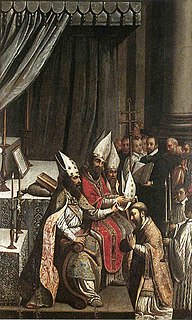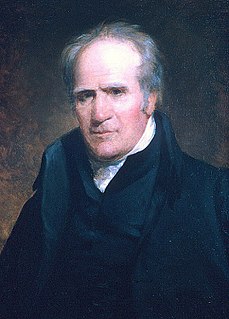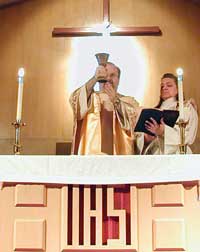
Apostolic succession is the method whereby the ministry of the Christian Church is held to be derived from the apostles by a continuous succession, which has usually been associated with a claim that the succession is through a series of bishops. Christians of the Roman Catholic, Eastern Orthodox, Oriental Orthodox, Old Catholic, Moravian, Hussite, Anglican, Church of the East, and Scandinavian Lutheran traditions maintain that "a bishop cannot have regular or valid orders unless he has been consecrated in this apostolic succession." Each of these groups does not necessarily consider consecration of the other groups as valid.
A bishop is an ordained or appointed member in a religious institution, who is generally entrusted with a position of authority and oversight. The title is most often used in Christian churches, but is also used in some Japanese Buddhist institutions, and by the Japanese new religion Tenrikyo.

In certain Christian churches, holy orders are the ordained ministries of bishop, priest (presbyter), and deacon, and the sacrament or rite by which candidates are ordained to those orders. Churches recognizing these orders include the Catholic Church, the Eastern Orthodox, Oriental Orthodox, Anglican, Assyrian, Old Catholic, Independent Catholic and some Lutheran churches. Except for Lutherans and some Anglicans, these churches regard ordination as a sacrament. The Anglo-Catholic tradition within Anglicanism identifies more with the Roman Catholic position about the sacramental nature of ordination.
The United Methodist Church (UMC) is a worldwide mainline Protestant denomination based in the United States, and a major part of Methodism. In the 19th century, its main predecessor, the Methodist Episcopal Church, was a leader in evangelicalism. The present denomination was founded in 1968 in Dallas, Texas, by union of the Methodist Church and the Evangelical United Brethren Church. The UMC traces its roots back to the revival movement of John and Charles Wesley in England, as well as the Great Awakening in the United States. As such, the church's theological orientation is decidedly Wesleyan. It embraces liturgical worship, holiness, and evangelical elements.

A deacon is a member of the diaconate, an office in Christian churches that is generally associated with service of some kind, but which varies among theological and denominational traditions. Major Christian churches, such as the Catholic Church, the Oriental Orthodox Churches, the Eastern Orthodox Church, the Scandinavian Lutheran Churches and the Anglican Church, including the Free Church of England, view the diaconate as part of the clerical state.

The Methodist Episcopal Church (MEC) was the oldest and largest Methodist denomination in the United States from its founding in 1784 until 1939. It was also the first religious denomination in the US to organize itself on a national basis. In 1939, the MEC reunited with two breakaway Methodist denominations to form the Methodist Church. In 1968, the Methodist Church merged with the Evangelical United Brethren Church to form the United Methodist Church.

The African Methodist Episcopal Zion Church, or the AME Zion Church or AMEZ, is a historically African-American Christian denomination based in the United States. It was officially formed in 1821 in New York City, but operated for a number of years before then. The African Methodist Episcopal Zion Church adheres to Wesleyan-Arminian theology.

The Christmas Conference was an historic founding conference of the newly independent Methodists within the United States held just after the American Revolution at Lovely Lane Chapel in Baltimore, Maryland, in 1784.
The Reformed Episcopal Church (REC) is an Anglican church of evangelical Episcopalian heritage. It was founded in 1873 in New York City by George David Cummins, formerly a bishop of the Protestant Episcopal Church.

Robert Richford Roberts distinguished himself as an American Methodist Circuit Rider, Pastor, Presiding Elder, and Bishop of the Methodist Episcopal Church, elected in 1816. He was the first married man in America to serve as Bishop of the Methodist Episcopal Church.
Robert Eric Hayes Jr. is an American bishop of the United Methodist Church (U.M.C.), currently serving in the Oklahoma Annual Conference. Before being elected to the episcopacy in 2004, Hayes served as treasurer of the Texas Annual Conference. He has served as a pastor, district superintendent, and college chaplain.
Leroy Charles Hodapp distinguished himself as a Methodist Pastor, District Superintendent, Annual Conference Official, and Bishop of the United Methodist Church (U.M.C.) who was elected in 1976.

The Evangelical Methodist Church (EMC) is a Christian denomination in the Wesleyan-Holiness tradition headquartered in Indianapolis, Indiana. The denomination reported 399 churches in the United States, Mexico, Burma/Myanmar, Canada, Philippines and several European and African nations in 2018, and a total of 34,656 members worldwide.

The General Conference, in many Methodist denominations, is the denomination's top legislative body for all matters.

Thomas Coke was the first Methodist bishop. Born in Brecon, Wales, he was ordained as a priest in 1772, but expelled from his Anglican pulpit of South Petherton for being a Methodist. Coke met John Wesley in 1776. He later co-founded Methodism in America and then established the Methodist missions overseas, which in the 19th century spread around the world.

An elder, in many Methodist churches, is ordained minister that has the responsibilities to preach and teach, preside at the celebration of the sacraments, administer the church through pastoral guidance, and lead the congregations under their care in service ministry to the world.
A district superintendent (DS), also known as a presiding elder, in many Methodist denominations, is a minister who serves in a supervisory position over a geographic "district" of churches providing spiritual and administrative leadership to those churches and their pastors.
The United Methodist Council of Bishops is the organization of which all active and retired Bishops in the United Methodist Connection are members. In the United Methodist system of polity, the Council of Bishops is the Executive Branch of United Methodist Church government.

Methodist views on the ordination of women in the rite of holy orders are diverse.

The history of Methodism in the United States dates back to the mid-18th century with the ministries of early Methodist preachers such as Laurence Coughlan and Robert Strawbridge. Following the American Revolution most of the Anglican clergy who had been in America came back to England. John Wesley, the founder of Methodism, sent Thomas Coke to America where he and Francis Asbury founded the Methodist Episcopal Church, which was to later establish itself as the largest denomination in America during the 19th century.









